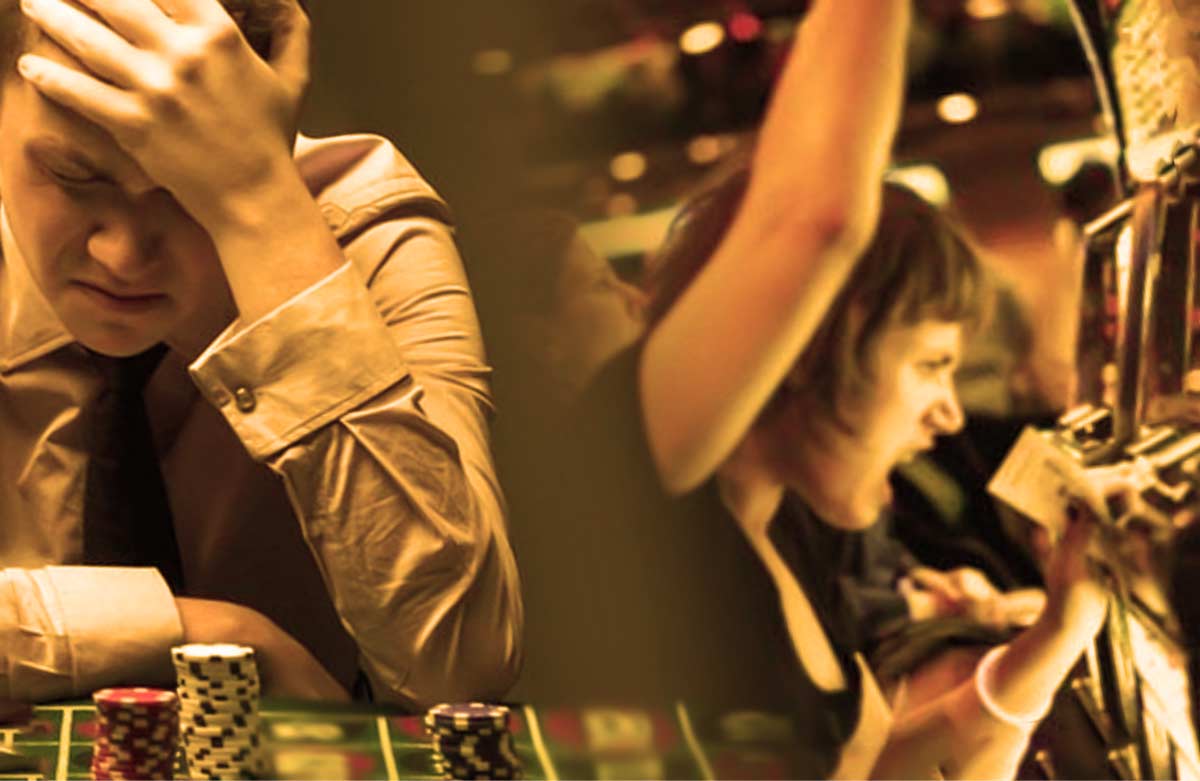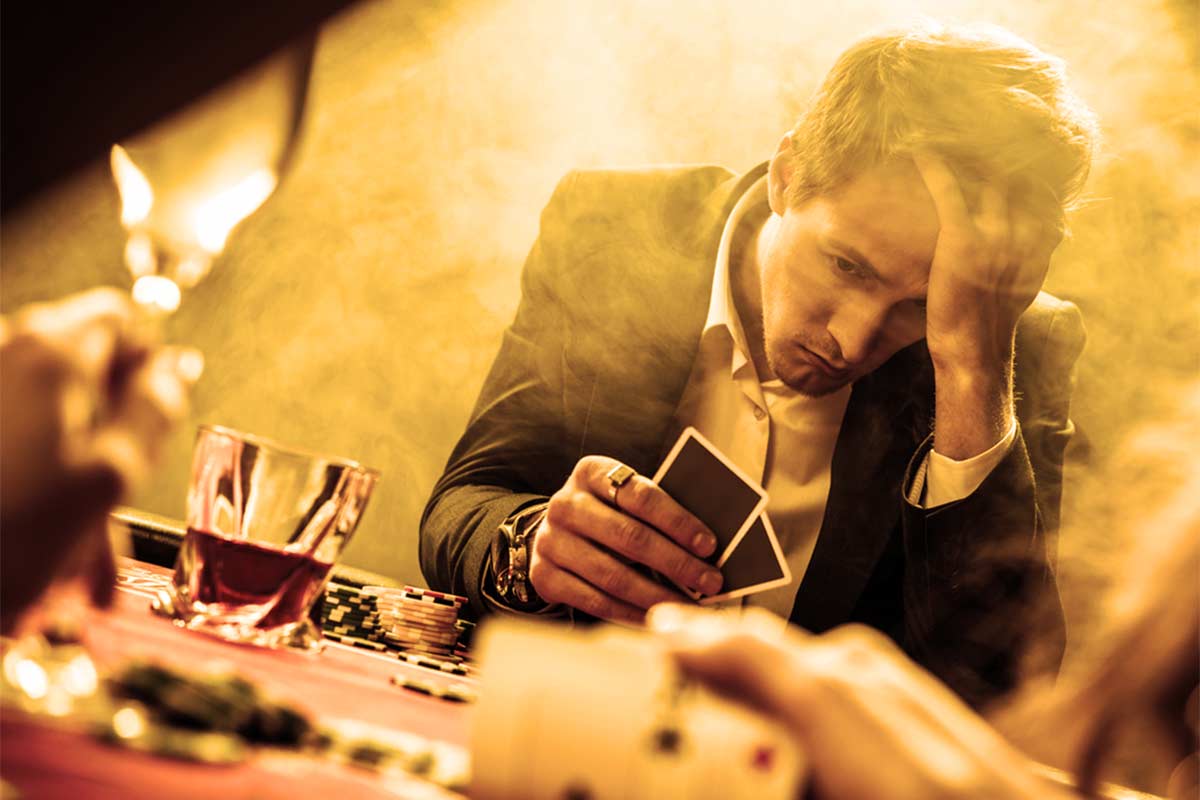It is estimated that about two percent of Canadian gamblers have a gambling addiction. This problem seriously interferes with their personal life, study and work. Today, this problem is the most common in the field of impulse control worldwide.
Addiction manifests itself in the uncontrollable desire of a person to continue playing, even though this negatively affects all aspects of the player’s life. The main reason gambling can be addictive is that it stimulates the brain in a similar way to alcohol and drugs.
The most common risk factors for addiction to casino games include enjoying the thrill of the game, constant desire to win back, and unrealistic ideas about the chances of winning.

Problem Gambling: Common Myths and Facts
Myth: To develop an addiction, you must play almost every day.
Fact: The frequency and time spent gambling is not an indicator of a problem. If casino games have negative consequences for a person’s life, then this is problem gambling.
Myth: If a person can afford to spend a lot of money on gambling, they are not problem gamblers.
Fact: The bottom line is that problem gambling involves more than just financial loss. By spending a lot of time playing, a person sacrifices their studies, work and time with friends and family. In the future, this affects not only the relationship of a person with the outside world and the loss of work but also their psychological state.
Myth: Only irresponsible and weak-willed gamblers become addicted.
Fact: Gambling problems can affect players of all income levels, intelligence and backgrounds. Strong and strong-willed people are also prone to gambling problems.
Myth: If a person spends a lot of time playing, their partners and families are usually to blame.
Fact: When a person becomes addicted, they try to rationalize their behaviour. Avoiding personal responsibility, the player tries to blame everyone instead of acknowledging the problem and accepting help.
Myth: If an addicted gambler borrows money, you need to help them pay off their debts.
Fact: This is a very bad idea. You need to pay off the debt, but the first thing you need to do is take care of the person and help him or her get rid of the addiction. If you pay off the debt for them, they will continue to play, and the problems with gambling will not end there.
Gambling Addiction: First Signs, Symptoms, Triggers
One of the key signs of gambling addiction is that a person is completely consumed by the desire to gamble, despite the negative impact on their lives. People who suffer from this type of addiction often describe their feelings as being in a state where they cannot stop.

Common signs of gambling addiction include:
- Strong desire to up the stake.
- Unsuccessful attempts to reduce the playing time or stop gambling at all.
- Constant irritability and anxiety due to the inability to play casino games.
- Every time a person visits a casino site to get rid of negative emotions and forget about some problems.
- An attempt to win back after losing money earlier.
- A person endangers any relationship and types of activities.
- Cases of theft and deception to obtain additional funds for the game.
Unlike gamblers who do not have any problems with gambling, addicted gamblers cannot stop after losing and do not know what a budget and betting limits are. Instead, they are relentlessly trying to win back to get back the lost money. As a rule, the punter plays even more in an attempt to recoup the losses but, without realizing it, loses even larger amounts. This repetitive cycle has many negative consequences for the player’s emotional and physical health.
Gambling Addiction Triggers
All players are at risk of gambling addiction, regardless of age, income and level of education. Unfortunately, no one can predict when and who may become addicted to casino games.
Even though the result of uncontrolled gaming behaviour is the deterioration of relationships in the family, at work and the emergence of financial problems, the player may not realize that they have problems for a long time.

Some of the factors that can cause gambling problems and addiction include:
- retirement;
- constant stress at work and in the family;
- traumatic events;
- emotional states, including constant anxiety and depression;
- loneliness;
- presence of other types of addiction;
- favourable environment (round-the-clock access to games, social circle where casino games are played).
Many studies show that people who have previously had other types of addiction are more likely to develop a gambling addiction. Neurological and genetic factors also play an important role.
Some additional factors may increase the risk of addiction. Namely:
- depression and anxiety, mental disorders;
- presence of other types of addiction, such as addiction to alcohol or drugs;
- use of certain medicines;
- gender, since gambling addiction is more common in men.
Self Help for Gambling Addiction
The first and most important step towards overcoming addiction to casino games is to recognize that you have this problem. Unfortunately, not all problem players are ready to take this step. This requires tremendous willpower and courage. Since problems with gambling, as a rule, bring huge financial problems and disappointment to family members.
However, do not despair and be alone with your problems. Instead, seek help from family members or friends. At this stage, the punter needs support. What can you do to help yourself:
- Find new, more environmentally friendly ways to get rid of negative emotions. Often a person visits a casino site to escape from a tense situation at work or in the family; to relax after a hard day at work; or escape from boredom and loneliness. Yes, gambling can be a good way to spend your free time. But if there is an opportunity to entertain yourself more healthily, it is better to use it.
- Get support from family and friends. All problems seem huge if you deal with them on your own. As for addiction, it is still more serious here. Of course, admitting to family and friends that you have a problem with gambling is difficult. But this is the most important step on the road to recovery. They will help you relax and be there for you in the most difficult moments.
- Visit a group of anonymous gambling addicts. In such clubs, you can anonymously get help from specialists. As a rule, a former player who managed to get rid of addiction acts as a mentor. Now they share their successful experience with you and help you through this difficult path.
Four Important Tips for Relatives of a Problem Gambler
If someone in your family or your close circle has a problem with gambling, it is important to respond to the situation in the right way. Here are some important tips from the experts:
Tip #1. Help yourself first. You cannot blame yourself. Protect yourself emotionally and financially from what is happening. Do not ignore your own needs because of a problem player, even if it is someone close to you.
Tip #2. Do not try to handle the problem on your own. Often, people who are faced with any kind of addiction from a loved one cannot cope with this and simply follow the player’s lead. There is nothing to be ashamed of if you turn to specialists or your friends for help. In such a way, you will only help your loved one.
Tip #3. Take control of your family budget. By setting certain limits on finances, you will be able to protect your partner from the temptation to spend a couple of hundred dollars on gambling entertainment. Yet you must understand that this is not the solution to the problem. This will only save your family finances.
The important thing to remember here is that addicts are very resourceful. Therefore, be prepared for a variety of ways to get money out of you. Do not give in to manipulation and threats. If you find it difficult to cope on your own, seek help from specialists. Remember that your goal is not to harm but to help.
Gaming Addiction Treatment

Many studies show that gambling addiction responds well to complex therapy. We are talking about taking medications and the help of a specialist, including a psychologist. In addition, cognitive behavioural therapy is often applied to patients. As a result, the problem player develops resistance to relapse and their habits change. It is also effective to participate in special groups to help those addicted to gambling.
Frequently Asked Questions
What is problem gambling?
This addiction to gambling interferes with a person in all areas of his life, including work, family and personal relationships. Often, problem gambling results from a violation of the main principle of responsible gambling, which states that gambling should be used solely for entertainment purposes. One of the main manifestations of problems with gambling can be an addiction to them.
Can I enjoy casino games without being addicted?
Yes. This is the main idea of responsible gambling. If you adhere to this principle and control your budget and time spent on games, then you do not have to worry about any addiction.
Can I become addicted if I have not played in a casino before?
Yes. Risk factors are always there. It all depends on how you perceive the gameplay. Control yourself, do not play instead of spending free time with your family and never give in to the desire to win back. Then you can protect yourself.
Can children have problems with gambling?
Yes. Although legal casinos do not offer their services to minors, it is very difficult for them to control access to such sites. In addition, according to research, children and teenagers are more prone to developing a gambling addiction. Therefore, we strongly recommend that parents control what sites their children visit.

